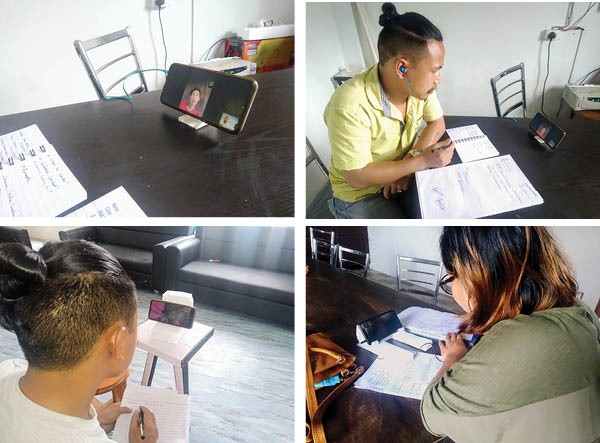CCSU officials conducting video calls with schools.

Moses Hongang Chang
Tuensang | October 5
A recent report brought out by the Confederation of Chang Students’ Union (CCSU), on the performance and attendance of teachers in government schools in Tuensang district has revealed that only about 30% of teachers are at their respective posting places while the remaining 70% have neither reported to their respective schools nor gave any notes so far.
CCSU, the apex body of the Chang students have been spearheading two missions— ‘Mission Wesen’ and ‘Mission Zero % Free,’ targeted towards primary level and class 10 students of government schools within its jurisdiction.
Normally, the union would conduct physical verification and checks on schools in each of the district’s villages. Its office bearers would be divided into teams and sent out to disseminate information and interact with the stakeholders of the education sector of the villages. However, with normal activities put on due to the COVID-19 pandemic, the union had to find new ways to continue monitoring school activities and bring out a comprehensive report.
In this regard, CCSU President Chingmak Kumchuba told The Morung Express that the union resorted to video calls with Village Education Committees (VECs), School Management and Development Committees (SMDCs), Students’ Unions and teachers. “We divided our office bearers and schools villages into three clusters to discuss on the matters pertaining to the smooth functioning of their respective schools,” he informed.
On paper, the initiative may seem to have solved the issue of checking on all the government schools, however, with most of the villages without internet connectivity and few with no mobile network coverage, the union has managed to reach out to only 39 out of the 47 villages. The remaining villages are not reachable even for telephonic conversations.
According to the union’s Assistant General Secretary Ben Langpong, “Video calls were made to villages that have better network coverage and voice calls to villages with unstable network. We had good interaction through video calls but can’t say the same for those villages where voice calls were made. It was also easy to check if all the stakeholders were present through video calls.”
However, the Union expressed optimism that the initiative would keep school authorities on their toes.
Mongko Chollen, Federal Assembly Secretary, CCSU also commented on this and said, “Video conferencing is a new experience for all of us and we appreciate those villages that responded positively. Monitoring keeps them on their toes.
It will ensure that there will be no negligence and subsequently the teachers will be compelled to stay in their respective posting places.”
Earlier in the year, the CCSU had issued directives to its federating units asking them to strictly follow its study hour schedule from 6 to 7:00 am and 6 to 8:00 pm.
Each federating unit monitors the students of their respective villages in schools while some have been using church buildings, community halls etc., as classrooms. In addition, house visitations to check on their study hour schedules are also being conducted.
Nyampong, President of Helipong Village Students’ Union said that his team has been conducting classes for Government Middle School Helipong for almost 4 months at the village community hall.
“Normally, the classes are held from 4:00 pm to 6:00 pm and we also conduct class test, mock exams as well as other extracurricular activities,” he said.
Nyampong also informs that the students in his village have completed the study syllabus set under the CCSU’s Mission 'Wesen.'
Despite the world’s current predicament, different NGOs in village level and student community have been putting in efforts to ensure continuity of education.
“We don’t want them (the students) to lose their precious time and therefore we are doing everything we can do from our end,” Kumchuba stated.
The CCSU’s report also highlighted that few soft copies and printed notes are being given to the students by the teachers who are in the station. While some utilise WhatsApp messenger app to distribute notes, with the dismal network connectivity, most of the note sharing is initiated through the Sochüm (Chang Naga dormitory) of their respective villages.
“The government has given out the order for teachers to report to their respective posting places but there has been no positive response from the teacher’s end,” Kumchuba added.






